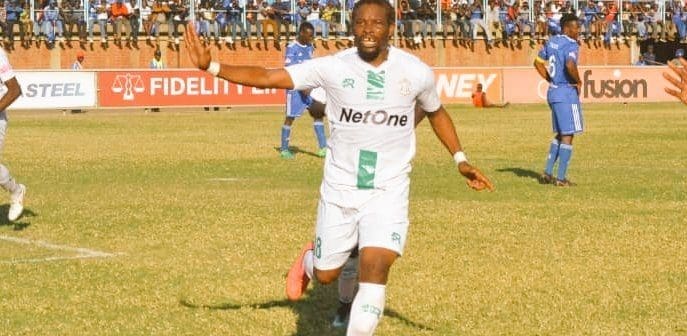As I sat back to watch Egypt take on Zimbabwe at the outset of this summer’s African Cup of Nations, I was fascinated by ‘The Warriors’. Their entrance to the stadium; full of song, happiness and pride, captured the imagination.
Though it’s something we’ve seen happen previously, especially with the African nations, it reiterated the joy, togetherness and release which sport, especially football, can bring.
Thinking about it though, what did I really know about football in Zimbabwe? How do people feel about it and what were the issues and challenges affecting the game over there?
I remember and know of some Zimbabweans who have made their mark in the game. Legendary Liverpool and Southampton goalkeeper Bruce Grobbelaar along with the mercurially talented Coventry man Peter Ndlovu were well known names across the world of football a quarter of a century ago.
More recently , I remember striker Benjani Mwaruwari performing admirably in the English top flight for Portsmouth and Manchester City amongst others, before returning to finish his career in African football.
As a keen follower of the English Football League, I know of Tendayi Darikwa and Macauley Bonne, plying their trade for Nottingham Forest and Charlton (previously Leyton Orient) respectively aswell as fleeting recollections of Knowledge Musona, now at Anderlecht, and Khama Billiat of the Kaiser Chiefs.

Photo – nottinghamforest.co.uk. Current Zimbabwe international Tendayi Darikwa.
As I write this feature, Marvelous Nakamba has joined the ranks of the English Premier League, moving to Aston Villa from Club Brugge after previous spells in France and The Netherlands. I’ll watch with interest to see how he gets on this season.
This proves however, that I didn’t know enough to form a proper opinion of Zimbabwean football. Instead of just skirting round the edges, I wanted to get a feel for what the game is like there and the demographics that surround it.
The lack of knowledge in terms of African football, especially domestic leagues, in my opinion is down to a chronic lack of media exposure. While we see North American (MLS), Asian (Chinese Super League) and even Australia’s A-League (now part of the Asian footballing Confederate) regularly available on our screens, there is a quite telling absence of African football, along with South American, available to us
There is, quite understandably, a heavy saturation of European football available to us across all media platforms, yet the continent(s) which supply Europe with many of their biggest names and top players are disappointingly overlooked.
I will look further into this issue throughout the piece as I aim to showcase Zimbabwean football from various perspectives and reflect on whether the country can be seen as something of a microcosm of Africa as a whole in football terms.
I could talk about the history of Zimbabwe and it’s football for an eternity, with all the racial, colonial and political conotations and divides that have (and to some extent continue to) shaped every aspect of life there.
Suffice to say, I’ll try and run by the key points to give some context to the issues that have affected the sport of football and it’s portrayal within the country.
Zimbabwe itself was formerly known as Rhodesia prior to its independence in 1980. The land was given this name upon colonisation by the British (and to a lesser degree, the Dutch) around 1850. Before that, it was home to various indigenous groups and tribes such as the San, Bantu, Shona, Nguni and Zulu.
The latter two led to the Ndebele people setting up their home in the country. This is still the case now, though the group have, in the past, been subject to strong repression and persecution from previous government regimes after independence, because of their ethnic, cultural, historic and lingual differences to the rest of Zimbabwe, controlled by the iron fist of Robert Mugabe and his ZANU forces.
However, the animosity appears to have mellowed considerably since the 1980’s and the Ndebele people remain in Zimbabwe to this day, inhabiting three provinces in the South West of the country. This area is known as modern day Matabeleland.
Obviously, the fracturuous times the country and its people have been through has had a defined affect on football. The game their can be dated back to 1892, with the initial inception of the Zimbabwe Football Association.
The first real progress came with the foundation of Highlanders Football Club (a Matabelele club) in 1926 and great rivals Dynamos (a club based in the Zimbabwean capital of Harare) in 1963 led to more local, rather than colonial, involvement in football and in turn FIFA affiliation in 1965.
The first Zimbabwean (Rhodesia at the time) football league was set up in 1962, and was a little unique by comparison to other sports as it allowed locals to participate and integrate with the dominant colonial white settlers in times of high racial tension and segregation.
It is believed that the settlers used football as a political and social tool to coerse co-operation and acceptance from the natives of the land.
In footballing terms, Dynamos have been by far the most successful team over the years, racking up 22 league titles, while Highlanders, with all their history and heritage, are seen somewhat as sleeping giants having won the league just seven times by comparison.
While Caps United and Chicken Inn FC have also risen to prominence, the aforementioned Dynamos and Highlanders really are the bedrock of Zimbabwean football and it’s tradition and culture.

Photo – liverpoolfc.com. Former Zimbabwe, Liverpool and Southampton goalkeeper Bruce Grobbelaar.
It would be fair to say the halcyon days for Zimbabwean football and it’s general notoriety arrived in the early 90’s, with both Bruce Grobbelaar and Peter Ndlovu playing for the national team. However, this period proved something of a false dawn for a Zimbabwe team constantly, but perhaps somewhat understandably not hitting the heights their talent is capable of.
To get an idea of where football is now and how certain dynamics impact on the game, I spoke to Leslie Chapata, A Zimbabwean football writer who’s undergrad thesis on the subject of football in the country and its impact on nationalism gained local and international recognition.
“To be honest, the standard of football in Zimbabwe has plummeted”. Les begins by telling me that while the league is still competitive, the quality on show has deteriorated significantly. The key reason for this? “The league has failed to grow financially, stadium attendance figures continue to drop and as we speak, there is no media entity paying for the right to broadcast (domestic) league matches”.

Photo- @FCPlatinum. Current Zimbabwean champions FC Platinum.
Les explains that the lack of finances in the game causes many of the top Zimbabwean players to pursue their careers elsewhere, mainly in neighbouring South Africa. “The Zimbabwe AFCON 2019 had only one domestic player, Lawrence Mhlanga – who was only called up after Raphael Kutinyu’s injury – this shows how much the local league has regressed”.
With the opinion that their domestic game is in decline, I wondered if the Zimbabwean Football Association could be doing more in their governance? Les believes they could certainly be doing a better job.
“The current administration is relatively new, but their tenure has already been blighted by scandals of national team players not having their wages paid on time. I have written about the previous administrations, led by Phillip Chiyangwa, Cuthbert Dube and Henrietta Rushwaya and I think it’s fair to say ZIFA’s moral compass has always pointed South”.
Les didn’t hold back in his views that the organisation often “bury their heads in the sand” when it comes to being accountable for their actions. “Just look at the Asiagate scandal to see just how much the Zimbabwe Football Association has let the nation down over the last few years” said Les, referring to a match fixing scandal involving officials and players of the Zimbabwe national team in 2012.
With the football authorities in Zimbabwe seemingly struggling to function properly or cohesively, I asked Les what he would like to see them focus on to get things moving in the right direction.
“For starters, they should focus more on grassroots football” Les believes the grassroots and academy set – ups across the country should be ZIFA’s priority. “Improvement and progress can only come if the planning is long term and not ad-hoc as is the case right now”.

Photo – @HerentalsFc. The Zimbabwe national team at AFCON this summer.
It seems the natives are disappointed with ZIFA’s lack of forethought and preparation overall. “For a nation that possesses so much talent, qualification for AFCON shouldn’t be an achievement. There should be long term planning that ensures World Cup qualification” says Les, adding ” there’s also need to improve the level and quality of the coaching”.
Les also makes the point that players with Zimbabwean roots are currently unable to play for the national team(s) as ZIFA don’t allow dual-citizenships, thus further harming the chances for progression in international terms. It is felt the relaxing of this self imposed rule will give a boost to the national setup.
With match attendances in the country falling, I asked Les just how important football is to the people of Zimbabwe? ” The people are really passionate about the sport”. Les explains “it defines the general mood when The Warriors are playing. All ethnic and political differences which divide the nation are put to one side”.
As an outsider, it can be difficult to gauge how the political instabilities and tensions within certain countries can affect people and communities on a day to day basis. Les says that, understandably, it has a huge impact on Zimbabwe in general and, in turn, the way football clubs there have to operate.
“It defines the general mood when The Warriors are playing. All ethnic and political differences which divide the nation are put to one side”
– Leslie Chapata
“The uncertainty has led to economic instability, this has had a domino effect, and the financial situation in Zimbabwe has definitely affected football and sport in general” explains Les. “For football clubs to perform financially, they should be able to be involved in various commercial endeavours such as advertisements, TV rights, merchandise sales, gate takings and kit sponsorships”. Les tells me that local businesses see no return on their investments in terms of sponsorship due to the high cost of living in Zimbabwe, a major factor caused by the constant instabilities.
However, despite the financial constraints people are under, Les tells me that anyone who wants to judge the importance of football in Zimbabwe should attend a league match between Dynamos and Highlanders (known as ‘the battle of Zimbabwe’). “The rivalry is talked about in the same breath as Liverpool v Manchester United” says Les. ” Come to think of it, football is actually a religion to most Zimbabweans”.
So how was the national teams performance at the recent African Cup of Nations viewed in Zimbabwe? “I think Zimbabwe played well against Egypt. Despite losing, they were not outplayed. The problem was they didn’t take full advantage of the chances they created in the second game” (a 1-1 draw with Uganda). Les believes that was a pivotal game where Zimbabwe dropped points. “The final group game against DR Congo (a heavy 0-4 defeat) was a total embarrassment. We were just not good enough over the three games we played because you are only as good as the chances you take. Scoring one goal in three games is not good enough”.
Les concluded with a firm opinion that African football should get more media exposure worldwide. ” Africa has, for some time now, produced several world class players and for that reason alone, African football should get more attention than it currently does”.

Photo – @BulawayoChiefs. Zimbabwe Premier League team Bulawayo Chiefs FC.
With a keen and knowledgeable follower of Zimbabwean football such as Leslie Chapata concerned about the state of the game there, I was interested to see how one of the clubs competing in the top flight, The Castle Lager Zimbabwe Premier Soccer League, felt about the situation. I contacted Bulawayo Chiefs FC and was pleased to receive some input from the club, given on the clubs behalf by the Chiefs Media Officer Thulani Javas Sibanda.
I began by asking for some general information about the club: “Bulawayo Chiefs is a community orientated club that was formed in 2012, with the aim of fostering football as a means to expose talent and offer avenues of living through football. The team has won promotion to the Premier League and are currently in their second season.”
After hearing strong concerns over the investment in grassroots and youth football throughout Zimbabwe, I asked how the Chiefs intend to address that issue? ” We have recently adopted a junior policy that sees us have players from under 13, 15, 17 and 19 age groups. We believe that this policy will be a vehicle that will drive talent from the young age (groups) to our top team setup”.
However, it is felt that there is still some way to go with youth football in general, with Thulani Sibanda believes the establishment of “a lot of well equipped football academies that will also offer consultancy and advice to our players” is needed to help and revolutionise progression.
The long term aim for this would be to produce more local players of technical, physical and mental strength to improve the domestic league and in turn see the national team featuring more prominently on the international stage.
The implementation of the above systems would almost certainly require a better infrastructure throughout provided by the Zimbabwean Football Association. When asked about how the current administration is handling things, the Chiefs representative commented ” we have learnt to be content with what we have on the table, though there is vast room for change towards being better”.
Thulani Sibanda agrees with Les Chapata that while top clubs such as Highlanders, Dynamos and Caps United maintain decent attendances, ” it’s not always rosey for other, less established clubs to attract crowds”, though he stops short of blaming the current political and economic issues for this.
“We have learned to be content with what we have on the table, though there is vast room towards change for being better”
– Thulani Javas Sibanda
It is believed by all at the Bulawayo Chiefs that efforts are being made (by participating clubs) to head Zimbabwean football back in the right direction.
The conclusion I make after speaking to a well respected football writer based in Zimbabwe and one of the Premier League’s participating clubs is that the willingness, desire and certainly necessity for improvement is there from the vast majority. There is a deep seated love for the game, which if harnessed correctly can lift spirits and act as as a solace to a nation seemingly in constant political turmoil in one way or another.
The clubs, officials, players and supporters are doing all they can with the limited help and resources afforded to them. What is clearly needed is a transparent, trustworthy and efficient Football Association running things in a more engaging and inclusive way for all.
Perhaps ZIFA could build trust by working more closely with clubs to provide and guarantee a long term plan to add quality and sustainability that will benefit everybody who loves the game and provide an outlet for the local and native people.
A key element for the development of football in Zimbabwe and Africa as a whole would be the aforementioned increase in the exposure of African football, both corporately and globally.

Photo – @BulawayoChiefs. Action from a Premier League match between Bulawayo Chiefs and Herentals College FC.
It must be said though, for any chance for this to happen, the infrastructure and reliability of football associations and administrations must improve, both in Zimbabwe and across the continent. We’ve seen previous instances of scandal and unrest within the Cameroon, Ghanaian, Beninese and Togolese Football Associations to name just a few, and for any outside interest and investment to happen, reputations need to be improved.
A point both Les and Thulani were firm in agreement on is the fact that more African football needs to be available globally. While Zimbabwean club sides are very active on social media, TV and radio coverage would open up all kinds of revenue streams in terms of sponsorship and advertising. Income which could be put back into the clubs structures to allow constant progression.
Whether it’s a lack of infrastructure and trust, logistical challenges or broadcaster/media ignorance, the fact remains that in the year 2019, we really should have more access to football from a continent which has provided the game with so much.
After hearing the views of some key football voices within Zimbabwe, join me next time for the second part of my look at the game there as I speak with well travelled book author and former Matabeleland coach Justin Walley and Sam Huwa of Pamtengo Radio’s (a Zimbabwean station based in Luton, England) Weekend Sports Diaries.
In the closing of part one, I’d like to thank Les Chapata and Thulani Javas Sibanda for both their time and views which has allowed us to become far more familiar with the current dynamics of football in Zimbabwe.
African Football
Prost International
![Prost International [PINT]](https://prostinternational.com/wp-content/uploads/2021/08/PINTtFontLogoRoboto1536x78.jpg)



